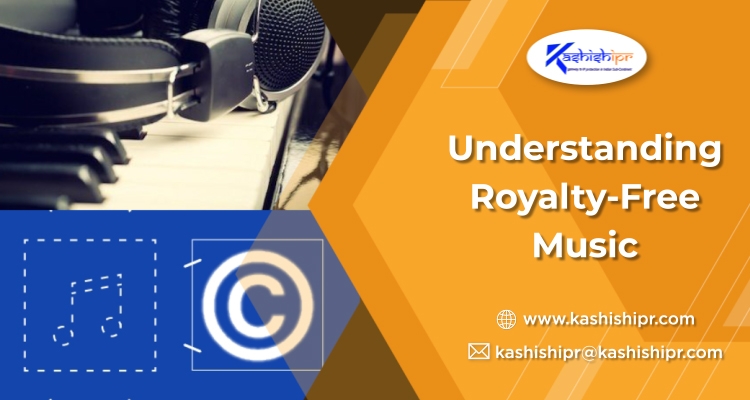Understanding Royalty-Free Music
 Posted On
Posted On
Video creators can relate to the feeling of shooting impeccable videos, editing them to perfection, and then understanding that they still need terrific tracks to go with the said videos. As a video creator, you may hop onto your laptop, start searching for free music, and finally come across platforms or websites offering royalty-free music or music without copyright (copyright-free music). All the video creators understand well that royalty-free music is the way ahead when one wants to be legal, i.e., do things in an authorized manner; however, there are still many inaccurate facts circulating about royalty-free music. Here in this article, we shall attempt to explain the concept of royalty-free music and dismiss some of the most common misinterpretations.
What is Royalty-Free Music?
The term royalty-free music means that you won’t be required to pay the royalty fee when you license media or music. When you license via some royalty-free media company, the company is responsible for paying the royalties and not you, which helps you save money in the long run, specifically when you wish to secure the license of a song for a lifetime.
Can Royalty-Free Music be Used for Commercial Purposes?
The answer to the question mentioned above is ‘Yes.’ No matter what the commercial purpose is for which you need royalty-free music (be it corporate video ads, monetized YouTube videos, or film projects, to name a few), you can use it, but ensure licensing it in the first place.
A common misconception is that instrumental music lies in the public domain and doesn’t need to be licensed. Although many instrumental tracks are available and accessible via the public domain, most of them belong to their rightful copyright owners, including royalty-free companies. It implies that making commercial use of royalty-free instrumental tracks as well requires you to secure the licensing rights.
Do You Need to Pay an Amount for Royalty-Free Music?
Although the term ‘free’ exists in royalty-free music, it isn’t actually free. However, it is essential to note that licensing royalty-free music implies you are cutting out the excess licensing fees and the costs of paying royalties.
Without any doubt, terms like royalty-free music or copyright-free music can be misleading, specifically to new content creators who aren’t well-versed with the legal issues involved in using this kind of music in their videos.
Copyright-free music means that nobody actually holds the exclusive copyright to the said music, due to which no royalties must be paid. However, coming across music that belongs to absolutely nobody and has zero Copyright Protection is exceedingly rare.
Most of the music tracks you find will be copyrighted, including royalty-free music. And the thing that comes as a surprise is that royalties are still being paid, even on royalty-free music. All this sounds a bit weird, but the thing is that when you work with a royalty-free platform or website, you are purchasing the license to the track you want. In this scenario, you become the licensee, i.e., free to use the said track or music in your videos. However, the company you purchased the license from shall be paying the royalties to the composers. To be clear, the company from which you’ll be purchasing such tracks shall be responsible for paying the royalties on the same tracks to their music producers or songwriters. Kindly note that if the video is displayed on a broadcast network, the network shall pay royalties to the performance rights organizations, which are then distributed to the music rights holders. Therefore, it would be wise to say that there is nothing like royalty-free music, not at least in the grand scheme of things. It implies that you won’t be required to pay the royalties because the company shall be doing so.
Quick Rundown of Facts about Royalty-Free Music
- It isn’t cost-free– Most individuals believe that if a track has a royalty-free label, it’s cost-free. However, such is not the case. Think of it as a fat-free cookie, i.e., it is free of fat, not free of cost. You need to pay for the track to own the license corresponding to its use.
- Royalty-free music and copyright-free music aren’t the same– There is a clear distinction between both the terms; royalty-free music has copyright, and copyright-free music is the one that has no copyright.
- Royalty-free music isn’t stock music– Although most royalty-free tracks come from stock music libraries, the two aren’t synonymous. A stock music library offers music tracks already in stock, i.e., already made and ready to license for use. Remember, stock music isn’t always royalty-free.
- Royalty-free music includes all genres and types – It isn’t restricted to background tunes and instrumental tracks. One can find every music type royalty-free.
- Finding completely copyright-free music is hard – Copyright-free music is like a unicorn, i.e., extremely rare. Almost every other track has some copyright protection attached to it, even music with a Creative Commons license.
- Not all licenses for royalty-free tracks are the same – It is imperative to note that every royalty-free music company operates and works differently. Hence, you must understand their licensing requirements, terms, and conditions before signing up with them. ✅ For more visit: https://www.kashishipr.com/
